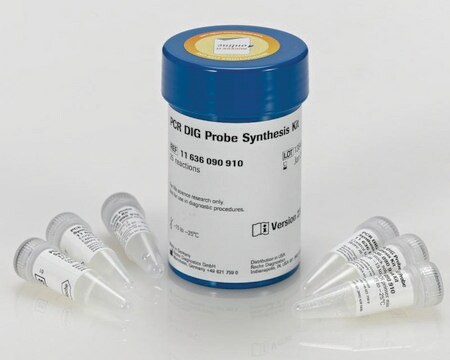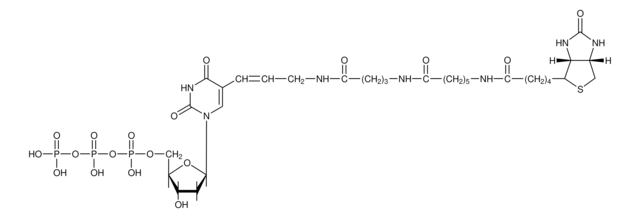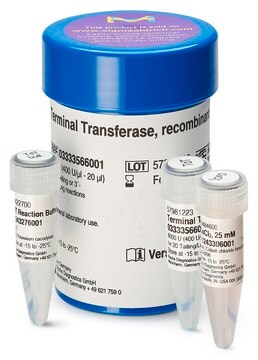DIUTPS-RO
Roche
Digoxigenin-11-dUTP, alkali-stable
Sinonimo/i:
Digoxigenin-11-dUTP, alkali-labile
About This Item
Prodotti consigliati
Saggio
≥85% (HPLC)
Livello qualitativo
Forma fisica
solution
PM
Mr 1090.7
Confezionamento
pkg of 125 μL (11558706910 [1 mM])
pkg of 5 × 125 μL (11570013910 [5x1 mM])
pkg of 25 μL (11093088910 [1 mM])
Produttore/marchio commerciale
Roche
λmax
222 and 292 nm
22430 and 8780
Temperatura di conservazione
−20°C
Cerchi prodotti simili? Visita Guida al confronto tra prodotti
Descrizione generale
Applicazioni
fluorescent in situ hHybridization (FISH) and polymerase chain reaction (PCR)
Note: When this nucleotide is subjected to 0.1 - 0.5 NaOH at +15 to +25°C, the DIG moiety will remain attached. It is therefore ideal for use in DIG-labeled DNA that needs to survive exposure to alkaline treatment. However, if you intend to make a DIG-labeled probe that can be removed by alkali denaturation (e.g ., during stripping and reprobing of blots), do not use this alkali-stable preparation. Instead, use the alkali-labile form of DIG-11-dUTP.
Azioni biochim/fisiol
Caratteristiche e vantaggi
Resistance to alkali: The preparation is stable in the presence of 0.1 - 0.5M NaOH at +15 to +25°C.
Qualità
Function tested by RPL.
Nota sulla preparazione
Storage conditions (working solution): A decomposition of approx. 5% may occur within 4 weeks at 15 to 25 °C.
Altre note
Codice della classe di stoccaggio
12 - Non Combustible Liquids
Classe di pericolosità dell'acqua (WGK)
nwg
Punto d’infiammabilità (°F)
does not flash
Punto d’infiammabilità (°C)
does not flash
Certificati d'analisi (COA)
Cerca il Certificati d'analisi (COA) digitando il numero di lotto/batch corrispondente. I numeri di lotto o di batch sono stampati sull'etichetta dei prodotti dopo la parola ‘Lotto’ o ‘Batch’.
Possiedi già questo prodotto?
I documenti relativi ai prodotti acquistati recentemente sono disponibili nell’Archivio dei documenti.
I clienti hanno visto anche
Il team dei nostri ricercatori vanta grande esperienza in tutte le aree della ricerca quali Life Science, scienza dei materiali, sintesi chimica, cromatografia, discipline analitiche, ecc..
Contatta l'Assistenza Tecnica.





